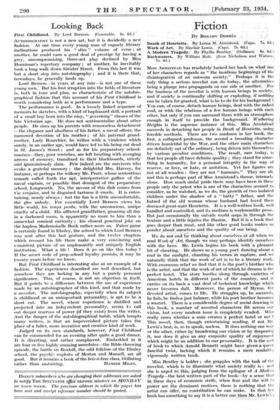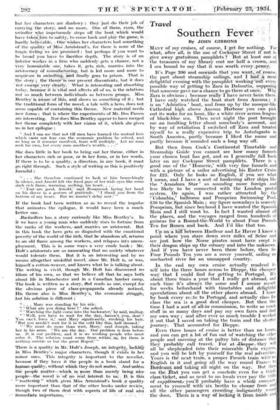Fiction
_ pokz.km, DOBRiE A Modern Tragedy. - By -Phyllis Bentley. (Gollanez. • Backwaters, By William Holt. (IVor Nicholson and Watson.: .7s. 6d.) Miss ARMISTEAD haS resolutely turned her back on what one of her characters regards as ".the insidious beginnings of the disintegration Of an outworn society:" Perhaps it is the only thing a serious novelist can do today, the alternative being a plunge into propaganda on one side or another. For the business of the novelist is with htiman beings in society, and if society is continually shifting or exploding, if nothing can be taken for granted, what is he to do for his background ? You can, of course, detach human'beirigs, deal -with the naked soul, or with the relations of a few human beings with each other, but only if you can surround theni with an atmosphere enough in itself to provide the background: Wu/tiering Heights is the supreme instance of this. Miss Arniistead succeeds in detaching her people in Death of Henrietta, using forcible methods. There are two madmen in her book,- -the first, a collapsed professor, the second a brooding character • driven homicidal by the War, and the other main characters are definitely out of die ordinary, being driven into themselves by various peculiar conditions. The result, _rare today, is that her people all have definite quality ; they stand for some- thing in humanity, for a personal integrity in the way of reserve, or love, or hate, or ambition. Yet her figures are not at all wooden : they are not " humours." They are all, and this is perhaps part of Miss Armistead's theme, intensely
alone. How much sinful pride there may have been in these people only the priest who is one of the characters seemed to consider, as he watched, as we do, the growth of two isolated children under the shadow of a " batty " father, and the hatred of the old woman whose husband had loved their deceased great-aunt Henrietta. It is a well-Mitten book, well
handled and controlled, and its medium is workmanlike prose. But just occasionally the, outside world seepa__in through the texture and a little injures the illusion. BuCit-iS a book that goes deeper than most, and like other good books makes us ponder about ourselves and the quality- of our Wng.
We do not end by thinking about ourielves at all when we read Work of -Art, though-We may perhaps identify ourselves with the hero. Mr. Lewis begins his bOOk with a pleasant bit of cheating. He shows us a young poet dancing about a roof in the sunlight, Chanting his verses-in rapture, and we naturally think that the work of art is to be a literary work. With enormous relief we find that it is the poet's brother 'who is the artist, and that the work of art of which he dreams is the perfect hotel. The story bustles along through varieties of American hotels in different parts of the country, and it carries on its back a vast deal of technical knowledge which never becomes dull. Moreover, the person of Myron, the devoted artist, comes to life. He struggles up, he succeeds, he fails, he finds a just balance, while his poet brother becomes a wastrel. There is a considerable degree of social drawing in this book, a number of assorted characters flit across our vision, but every modern issue is completely evaded. Who really cares whether a man creates a perfect hotel or not ? This novel, then, though entertaining reading, if not Mr. Lewis's best, is, so to speak, useless. It does nothing one way or the other, either by broadening our vision or by deepeaing it, nor does it give us any exquisite quality of enjoyment which might be an addition to our personality. It is the sort of book to which Arnold Bennett might have given a queer fanciful twist, lacking which it remains a mere readable, vigorously written book.
Miss Bentley is bolder ; she grapples with the task of the novelist, which is to illuminate what society really is : and she is urged to this, judging from the epilogue of A Modern Traged#1—the'best written part of the book—by a sense that in theSe days of economic strife, when fear and the will to power are the dominant motives, there is nothing that the artist can offer, no contribution he can make. In that her book has something to say it is a better one than Mr. Lewis's ; ,but her charaCterS are ShadOwy : they*just -do their job of carrying the story; anchno. more.- One of them, eyen, the
swindler. who. impetuously steps off the boat which would
haVe fakkrijilini:to-safety, to come back and play the game, is
hardly One wishes her characters. had something of the quality of Armistead's, for there is none of the Aragie feeling we are promised : but perhaps if you want to
be broad you' have to aerifice depth. The story is of an 'inferior worker in a firm who suddenly gets a -chance,' not a very honoiiiable 'one; takes it gets rich, marries into the , aristocracy of manufacturing, but is led more and more to ,acquiesce in swindling-, and finally goes to prison. That is the story ; the theme is our present discontents, but it does ; not emerge very clearly. What is interesting and absorbing today, hecanse it is Vital and affects all of us, is the relations not so much between, individuals 'as between groups. Miss Bentley is iiware'of 'this, and .shows us something.' of it ; but the traditional form of the novel, a tale with a hero, does not seem capable of containing this theme. New material needs new forms : that is where the experiments of Mr. Dos Passo's are interesting. Nor does Miss Bentley appear to have merged her theme completely with her vision of it, which she gives us in her epilogue : " And I can see that not till men have learned the mutual love which casts out fear. can the economic problem be solved, and • as long as it remains unsolVed, fearS will multiply. Let no man
seek his own, but every man another's wealth., . . ." •
She does little in her book to bring. out her theme, either in her characters rich or poor, or in her form, or in her wordS. If there is to he a quality, a direction, in any book, it must go right through. Such a style of writing as this is positively harmful : " . . She therefore continued to look at him beseechingly in silence, and Arnold felt the fixed gaze of her wide eyes like some dark rich flame, warming, melting, 'his heart.. . .
are good, Arnold,' - FAA Itostkmend-, -laying .her hand on his sleeve in a gesture of gralitUde. I thank you from the bottom of my heart. But we mustn't delay now.' " If the book had been written so .as to - reveal the impulse that animates -the epilogue, it would have been a much
better one. •
Back vdters has a story curiously: like Miss Bentley's. In: it we" have a young man ,who suddenly rises to fortune from the ranks of the workers,-and 'marries an aristocrat. But in this book the hero gets so disgusted with the emotional poverty-of the world-of the rich-, that he abandons all,imettuns to an old flame among the workers,.and relapses into unem- ployment. This is in some ways a very crude book : Mr. Holt's aristocrats are so, nauseating that no society 'whatever would tolerate them. But it is an interesting and by no means altogether unskilful novel; since Mr. Holt is, or was, himself a cotton-weaver,- and knows what he is talking about. The writing is vivid, though' Mr: Holt has AiseoVered no idiom of his own, so that we believe all that, he: says both . about life in Manchester and in a Canadianlumber camp. The book is written as a story, 'mid reads 'as one, except for the obvious piece of class-propaganda already noticed. His theme also is Miss Bentley's, the economic struggle,
but his solution is different i • . Mary was standing by his side.
'.What are you doing here 2 she asked. . • " Watching the light come into the backwater,'-he said, 'smiling.
" Well, you have to wait for the day,..haven't_ you;-_dear ? You can't. force it,'. said .Mary .significantly, stroking his hair. ' But you needn't wait for it in the cold like this, half dressed.' •
" We must do more than wait, Mary,' said Joseph, taking her in his arms. We are the day. Our problem is here before us. .It, is our problem, and it is we working people who must solve it. The solution must come from within:Am, lc; there is
nothing outside us but the great Bogod.' " •
There is a quality in Mr. Holt's Joseph, an 'integrity, lackilik in Miss Bentley's major characters, though it exists in her
minor ones. This integrity is important to the novelist, because if they have it the people in a book .stand for: a human quality, without which they do not *atter. .And unless the people rnatter—yrhich is-more than merely being nice people—the novel is 'of no real. interest to It is thiS " mattering " which giveS Miss Armistead's book a.--quality More important than that of the' other books 'Under reide'w,
though two of them deal with aspects of life of real and ' immediate linpottatice:
•

















































 Previous page
Previous page